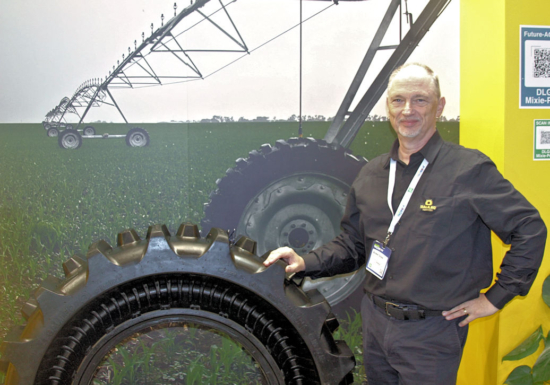Farming without pressure – Galileo’s growing CupWheel range
 CEO Dr Armin Schon with the Galileo IrriCup (Photo: Stephen Goodchild / Tyre Industry Publications Ltd)
CEO Dr Armin Schon with the Galileo IrriCup (Photo: Stephen Goodchild / Tyre Industry Publications Ltd)
It’s about a decade since we first saw CupWheel airless tyre technology. We knew it then as Mitas PneuTrac, unaware at the time of Israeli firm Galileo and its novel product. Galileo was founded in 2011 by Alon Hayka and CupWheel inventor Avishay Novoplanski. Over the years the company has brought a growing range to market under its own name and returned to Agritechnica this month to present its latest products.
These include the Galileo IrriCup for mobile irrigation systems. Pointing out the features of this tyre, Dr Armin Schon, chief executive officer of Galileo Wheel, says that IrriCup behaves like a VF tyre but contains absolutely no air. “This means that all required flexibility is present in the sidewall construction and the tyre can travel over stones and other obstacles without any issues. Furthermore, the user does not need to stop to adjust air pressure when conditions change.”
In addition to zero downtime, IrriCup also offers reduced rutting of fields thanks to a larger footprint that provides an average of 30 per cent more surface contact.
Pneumatic – but barely so
Not all Galileo tyres contain zero air. Schon showed us the AgriCup tractor tyre, which Galileo Wheel displayed in the recently introduced larger sizes 710/70R38 and 600/65R28. Armin Schon describes these as “pneumatic, but with minimal pressure.” Galileo Wheel’s product information recommends an operating pressure of 1.2 bar or 17.4 psi for these tyres, but Schon says they can work at pressures as low as 0.4 bar or 5.8 psi. “They can drive with the same pressure in the field and on the road. In contrast to VF, you mustn’t stop and adjust air pressure. Lateral stability comes from the construction and not from air pressure.”
Galileo’s literature says AgriCup’s “sidewall durability” enables the tyre to have a “mega-sized footprint that brings supreme flotation, a uniform load distribution with reduced soil compaction and zero downtime.”
Made in Israel & India
Zero air tyres are produced for Galileo in India, while Yokohama Off Highway Tires’ Alliance business manufactures the tractor tyres in Israel. The latter can be mounted on standard rims, whereas special rims are required for irrigation and loader tyres.
Dr Schon confirms that almost all CupWheel tyres on the market today are sold under the Galileo brand name, a range that Kirkby Tyres exclusively distributes in the UK and Ireland. A single PneuTrac product is manufactured under licence; this is a small tyre intended for fitment on tractors used in winery applications. Following the acquisition of Mitas in 2016, PneuTrac has been sold under the Trelleborg brand name.
Galileo displayed its latest range, including AgriCup, IrriCup and SkidCup (Photo: Stephen Goodchild / Tyre Industry Publications Ltd)
No trade-off
Avishay Novoplanski was kind enough to explain the technology behind CupWheel to us when we met him at Agritechnica 2019, and it’s worth repeating this here. The invention began with Novoplanski identifying a limitation related to pneumatic tyres – the air they require must be somehow contained, and when tyre developers attempt to give this ‘container’ flexibility in a certain direction it will also become flexible in other, undesired directions. “For tyres, this means that vertical suspension comes at the expense of lateral stability,” he clarified.
Using a paper coffee cup to demonstrate the workings of CupWheel, Novoplanski squeezed the cup’s rim until it was no longer perfectly round. He pointed out when squeezed and rolled, the rim resembles a caterpillar track but possesses a flexibility that doesn’t affect the shape’s stiffness in another direction. “If it were a wheel, I could use air pressure to make it as flexible or as stiff as I wanted but maintain stiffness in the other direction at all times.”
As Avishay Novoplanski then showed us, the CupWheel design resembles two inverted cups. This configuration creates a v-shaped sidewall that provides good lateral stability and handling under minimal air pressure. At the same time, the CupWheel’s tread extends to create a longer footprint that is not dissimilar to a track yet maintains uniform pressure distribution like a radial tyre.
“You can have something that is similar to a wheeled track,” added the co-founder, who is also chief technical officer at Galileo Wheel. “It’s like a track, it is very flexible vertically, but laterally you have the same stiffness. The whole principle is that we break the correlation between lateral and vertical stability. There’s no longer a trade-off.”





Comments